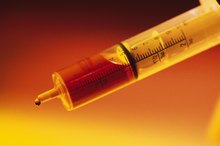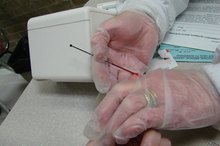Elevated Alkaline and Phosphatase During Pregnancy
Alkaline phosphatase is the term used to describe two enzymes normally found in the liver and bones. The kidney cells lining the intestine and the placenta, the organ that nourishes the growing fetus in the uterus, can also produce alkaline phosphatase. Alkaline phosphatase levels normally rise in pregnancy, but rises can also occur with liver disorders and other diseases.
Causes
Levels of alkaline phosphatase in the blood most often rise when either the liver or the bone is damaged. The damaged tissues release a larger-than-normal amount of ALP into the blood. Liver damage normally also causes a rise in aspartate aminotransferase, alanine aminotransferase or bilirubin. in addition to a rise in ALP. If bone damage is causing an elevated ALP, calcium and phosphorus levels may also be elevated.
- Levels of alkaline phosphatase in the blood most often rise when either the liver or the bone is damaged.
Pregnancy Levels
What Does a High SGOT in a Liver Function Test Mean?
Learn More
Since the placenta produces additional ALP in pregnancy, levels normally rise, especially in late pregnancy. Increases of twice the normal range of 50 to 75 mg/dl occur normally in pregnancy, Jeremy E. Kaslow, M.D. explains on his website, drkaslow.com. Normal levels can reach three to four times the normal range, Christine Hunt, M.D. of Duke University explains in a February 1999 article published in the “American Family Physician.”
- Since the placenta produces additional ALP in pregnancy, levels normally rise, especially in late pregnancy.
- Increases of twice the normal range of 50 to 75 mg/dl occur normally in pregnancy, Jeremy E. Kaslow, M.D.
- explains on his website, drkaslow.com.
Liver Disease in Pregnancy
Because ALP levels normally rise in late pregnancy, this lab test is not diagnostic alone for liver problems; bilirubin, AST and ALT increases have more diagnostic value for liver disease in pregnancy. Liver disease in pregnancy can include pre-eclampsia, HELLP syndrome, which stands for hemolysis-elevated liver enzymes, and low platelets or intrahepatic cholelithiasis of pregnancy, or ICP, which causes severe itching and possible jaundice due to a blockage of bile flow. A rise of around 2.4 times normal can occur in ICP, according to Luis Marsano, M.D. of the University of Louisville. Preeclampsia and HELLP syndrome are potentially life-threatening disorders, whereas lab values other than ALP have more diagnostic value.
- Because ALP levels normally rise in late pregnancy, this lab test is not diagnostic alone for liver problems; bilirubin, AST and ALT increases have more diagnostic value for liver disease in pregnancy.
- Liver disease in pregnancy can include pre-eclampsia, HELLP syndrome, which stands for hemolysis-elevated liver enzymes, and low platelets or intrahepatic cholelithiasis of pregnancy, or ICP, which causes severe itching and possible jaundice due to a blockage of bile flow.
Considerations
Elevated Liver Enzymes & Itchy Skin
Learn More
Elevated alkaline phosphatase levels of two to four times normal late in pregnancy are not a reason for concern. Elevated levels early in pregnancy may indicate a problem with the liver or bones and do need evaluation, although ALP levels alone are not diagnostic of any one disease since heart disorders, certain cancers, autoimmune diseases and gastrointestinal disorders can also cause a rise in ALP. Diseases such as mononucleosis and cytomegalovirus, which can be harmful to a fetus, can also cause rises in ALP.
Related Articles
References
- Lab Tests Online: Alkaline Phosphatase
- Univeristy of Louisville; Liver Disease in Pregnancy; Luis Masano, M.D.
- Li D, Lv H, Hao X, Hu B, Song Y. Prognostic value of serum alkaline phosphatase in the survival of prostate cancer: evidence from a meta-analysis. Cancer Manag Res. 2018;10:3125-3139. doi:10.2147/CMAR.S174237
- Siddique A, Kowdley KV. Approach to a patient with elevated serum alkaline phosphatase. Clin Liver Dis. 2012;16(2):199-229. doi:10.1016/j.cld.2012.03.012
- Kumar: Robbins and Cotran: Pathologic Basis of Disease, 7th ed.
Writer Bio
A registered nurse with more than 25 years of experience in oncology, labor/delivery, neonatal intensive care, infertility and ophthalmology, Sharon Perkins has also coauthored and edited numerous health books for the Wiley "Dummies" series. Perkins also has extensive experience working in home health with medically fragile pediatric patients.









